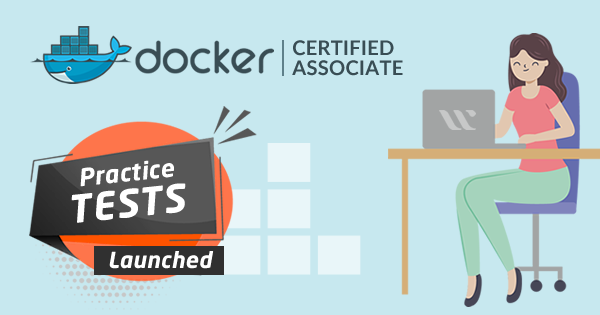DevOps has been more than just a revolutionary concept in recent times for improving application delivery. The demand for DevOps has substantially increased recently, with a prominent focus on its ability to deliver better productivity for all businesses. Therefore, it is reasonable for many aspiring candidates to look for a reliable, DevOps career guide.
The career guide for DevOps should be adequately capable of addressing the requirements of information that can help all candidates to find the ideal path to start a career in DevOps. The following discussion presents a reliable impression of the skills required for becoming a DevOps engineer. Aspiring candidates can use the following discussion to reflect on the important pointers to start AWS DevOps training and gain the necessary expertise for different DevOps Engineer jobs.
Check out our DevOps Certification Training Courses and start your preparation for one to get ahead in your career.
Why Choose a DevOps Career?
First of all, it is important to note that various organizations are transferring to DevOps, a paradigm that enables the integration of software developers and IT operations professionals for enabling smoother production workflow. As a result, DevOps engineers have a formidable demand in recent times. Glassdoor ranked DevOps Engineer jobs among the top entries in its list of best jobs in the US in 2018.
DevOps is basically the combination of Software Development and IT Operations, two of the most critical pillars of application performance. Prior to pursuing a DevOps Career Guide, candidates should have a basic understanding of DevOps. Candidates have to understand the role of DevOps in fabricating a workflow that ensures communication among IT professionals and software developers.
DevOps has a promising role in simplifying and coordinating the management of production environments, alongside ensuring software deployment and infrastructure modifications. With the increasing DevOps trends, candidates with the primary understanding of DevOps would face minimal difficulties in carving an ideal career path for themselves. So, one needs to know the important points before starting their career in DevOps.
If you are confused about the success in a DevOps career, here are the Top Reasons to Choose DevOps Career.
Responsibilities of DevOps Engineers
Now, the next step in answer to how to become a DevOps Engineer would actually refer to the responsibilities. Before you dive right ahead into a DevOps training to learn DevOps, it is important to reflect on the responsibilities you have to address as a DevOps Engineer.
- At the most fundamental level, DevOps Engineers works as tech professionals with an understanding of the Software Development Lifecycle (SDLC).
- DevOps engineers also have skills for the utilization of engineering tools and processes to address diverse operations challenges.
- DevOps Engineer should have the capability to balance various roles, including testing, coding, and integration.
- Most important of all, DevOps Engineers have to strive constantly for ensuring faster collaboration and better speed of the development process.
- DevOps Engineers could create code for applications as well as maintain the build, operations, and deployment aspects in a continuously automated process following code development.
- One of the most critical aspects of DevOps engineer responsibilities in a DevOps career guide must be the need for working in collaboration with business stakeholders and management of the complete workflow to ensure its functionality.
- The majority of the daily activities for DevOps engineers include build and deployment.
- In addition, DevOps Engineers also have to communicate the results to different teams alongside taking care of configuration and automation.
- At the same time, it is also important to reflect on the need for programming to address the disparities between software development and operations teams.
Also Check: Top DevOps Certifications
Skill Required to Get DevOps Jobs
One of the most common things that readers search for in a DevOps career guide is the answer to crack their way into a DevOps career without any experience. So, if you are also looking for the answer of how to get a DevOps job with no experience, you will be disappointed. DevOps is a significant value advantage for all enterprises, and individuals with hands-on expertise and real-world experience in the delivery of enterprise solutions can only take on DevOps careers.
Although experience is completely dependent on the ability to transition from conventional roles to DevOps roles with ease, aspiring DevOps Engineers would still need the required skills for becoming a DevOps professional. As a matter of fact, the skills required for becoming a DevOps professional is one of the formidable pointers in any DevOps career guide. So, let us take a look at the various skill, knowledge, and experience requirements that can build your path towards a prolific DevOps career.
-
Programming Skills are Mandatory
One of the most mandatory and basic DevOps skills required for becoming a DevOps engineer is programming. The high demand for DevOps engineer jobs presents formidable competition for job seekers. So, aspiring candidates for DevOps Engineer jobs must have programming skills to stay ahead. High-level programming languages such as Ruby, Python, and Java are important requirements for DevOps engineers.
Expertise in these programming languages puts a DevOps engineer in a competitive position than just an IT operation professional. Candidates have to leverage programming knowledge for debugging chunks of code according to requirements and troubleshoot errors in build and deployment. Any DevOps Career guide would focus on the importance of programming for aspiring professionals to deliver business value.
DevOps engineer can utilize programming knowledge for coordinating automated processes such as application installation, server trigger, validation, configuration, and others. In addition, DevOps professionals need programming knowledge for developing tools to automate different processes.
-
System Administration Skills
In the next step of the DevOps career roadmap, candidates must reflect on obtaining the same level of knowledge as a system administrator. System administrators generally handle a lot of complex tasks related to the management of application and enterprise infrastructure. System administrators take over the tasks for monitoring build, deployment, and testing, debugging, and troubleshooting servers.
DevOps professionals have to develop skills in these areas, thereby implying the potential to learn from system administrators. Candidates should also learn the system administrator’s perspective on automation and other crucial highlights of the processes for server and infrastructure deployment.
Also Check: Top 10 Skills for DevOps Professionals
-
Skills for Networking and Storage
The striking highlight of a DevOps career guide would also reflect on network and storage skills. Candidates aspiring to learn DevOps should focus on the importance of dealing with various servers, storage, connections, and data, along with abilities for the management of network issues. Fundamental knowledge of networking can be a good start for aspiring DevOps engineers.
Gradually you have to gain experience in working with real-time systems for developing explicit knowledge regarding different APIs, capacity decisions, and protocols for supporting the desired infrastructure requirements. Network engineers with comprehensive fluency in server maintenance can also explore a DevOps career path easily.
Candidates should note that scripting skills, along with expertise in specific configuration & deployment tools, can also support their expertise in network and storage for DevOps. If you are looking for a long-term career in DevOps, then start taking Linux training and learn about public clouds such as AWS, Azure, and OpenStack. Candidates should also explore the areas of continuous integration with tools such as Kubernetes or Jenkins, which would become evident in the long run for the professional responsibilities of DevOps engineers.
-
Fluency in Infrastructure Management and Compliance
The emphasis on infrastructure management and compliance in a DevOps career guide could never be undermined. New systems could adapt effectively to the DevOps workflow, although with certain restrictions on legacy systems. Legacy systems require comprehensive configuration for security, balance, scalability, compliance, and backup facility.
At the same time, it is important for DevOps to avoid downtime for the other enterprises. Therefore, DevOps engineers end up with the need for knowledge and expertise in containerization and cluster management software. Expertise in these areas can help DevOps professionals for the flexible integration of new deployments and existing systems in the DevOps landscape.
-
Knowledge of the Cloud and Virtualization
The importance of virtualization and cloud skills also presents notable requirements for aspiring DevOps professionals. As a matter of fact, these skills are a must-have in any DevOps career guide. Virtualization enables operations of virtual instances of computer systems for distributing a single system into smaller ones. Therefore, candidates need network virtualization knowledge with a comprehensive awareness of private, public, and hybrid clouds.
Also Read: HOW DEVOPS AND CLOUD COMPUTING FORM A WINNING COMBINATION
-
Security Expertise
One of the most critical requirements for candidates to become a DevOps Engineer is security skills. The overall safeguards for a DevOps environment largely depend on various practices created through different techniques, policies, and strategies. Security is highly crucial in all stages of the DevOps cycle due to the vulnerabilities in each stage. In addition, the tools and containers used in the management of cloud deployments could also be subject to vulnerabilities.
DevOps engineers have to tailor their DevOps career guide in a way to hone skills in DevOps security best practices. DevOps engineers should have a clear impression of the policies rewarded for different accounts. In addition, the other skill requirements, in this case, include the automation of security processes and policy creation and enforcement. Candidates should also learn about skills for integrating security in the early stages of development.
At the same time, candidates should ensure that they have the skills for reinforcing security at all stages of SDLC. Furthermore, candidates should also focus on training in the security best practices for management and control of privileged access. Candidates should also specialize in the identification and removal of dormant accounts alongside enforcing the least possible privileges.
-
Certifications are a Crucial Requirement
Apart from the above-mentioned skill requirements, candidates would also require certifications for their DevOps career roadmap. Candidates could explore any beginner’s guide for a career in DevOps and find the suggestion to get a DevOps certification every time. DevOps certifications required candidates to prove a wide spectrum of skills for core DevOps roles and responsibilities.
Popular public cloud platforms such as AWS and Azure provide DevOps Engineer Professional and DevOps Engineer Expert certifications. This is, in fact, very good news for all candidates who want to become DevOps engineers. DevOps certifications are not just the indicators of an individual’s DevOps expertise but also their commitment to the field.
The comprehensive training and role-specific evaluation of candidate skills and knowledge in DevOps certifications are their formidable highlights. So, they act as credible instruments to set up the career of an individual in DevOps. The credibility of Azure and AWS alongside adoption across multiple enterprises for DevOps presents prolific career opportunities for certified candidates. Another notable advantage of certifications for your career in DevOps would be the rise in salary packages. Certified candidates are likely to command higher salaries than non-certified candidates in the DevOps landscape.
Preparing for a DevOps Interview? Go through these most common DevOps interview questions and get ready to ace the interview.
There are many skills that are useful for professionals working in DevOps. Some of the key skills that are often sought after by employers include:
- Programming languages: Proficiency in programming languages such as Python, Java, and C++ can be useful for building and automating processes in DevOps.
- Configuration management tools: Experience with tools such as Ansible, Puppet, and Chef can be useful for managing and deploying infrastructure in a DevOps environment.
- Containerization: Knowledge of containerization technologies such as Docker can be useful for building and deploying applications in a DevOps environment.
- Cloud computing: Experience with cloud computing platforms such as AWS, Azure, and Google Cloud can be useful for building and deploying applications in the cloud.
- Monitoring and log analysis: Experience with tools such as Splunk and ELK can be useful for monitoring and analyzing the performance and stability of systems in a DevOps environment.
- Collaboration and communication: Strong communication and collaboration skills are essential for working effectively in a DevOps environment, where teams often work closely together.
In addition to these technical skills, it’s also important for professionals working in DevOps to have a strong understanding of agile and lean principles, as well as a commitment to continuous learning and improvement.
Final Words
Therefore, the above-mentioned DevOps career guide can help you begin your journey in DevOps right now. You know what a DevOps engineer does and the skills they need for it. In addition, you also know what you will need to prove your skills needed for lucrative DevOps jobs, i.e., certifications; Microsoft DevOps Certification & AWS DevOps Certification.
Therefore, you can easily build your skill and knowledge foundation and choose the DevOps certification according to your requirements. The skill requirements for a career in DevOps are the foremost pointers to help any individual develop their DevOps expertise. So, start right now and learn more about DevOps to give long-term opportunities for your career!
- Top 10 Highest Paying Cloud Certifications in 2024 - March 1, 2023
- 12 AWS Certifications – Which One Should I Choose? - February 22, 2023
- 11 Kubernetes Security Best Practices you should follow in 2024 - May 30, 2022
- How to run Kubernetes on AWS – A detailed Guide! - May 30, 2022
- Free questions on CompTIA Network+ (N10-008) Certification Exam - April 13, 2022
- 30 Free Questions on Microsoft Azure AI Fundamentals (AI-900) - March 25, 2022
- How to Integrate Jenkins with GitHub? - March 22, 2022
- How to Create CI/CD Pipeline Inside Jenkins ? - March 22, 2022



